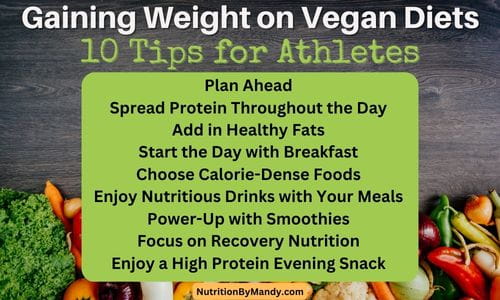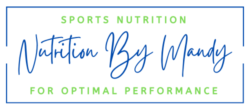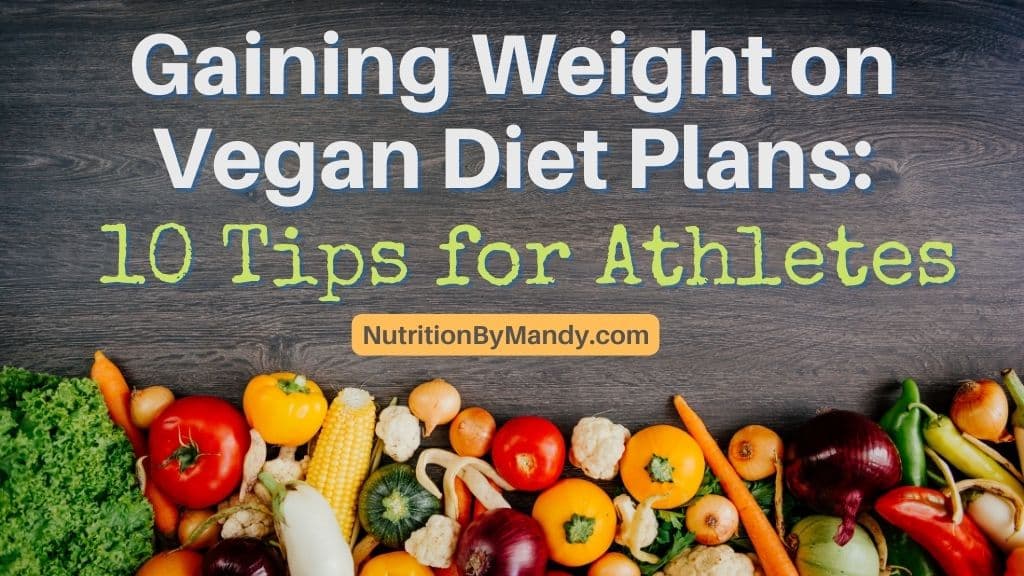Gaining Weight on Vegan Diet Plans: 10 Tips for Athletes
Athletes commonly desire to gain lean body weight to help support their performance goals. When following a vegan diet, athletes may wonder what the best strategies are to help them with gaining weight.
Let’s take a look at what following a vegan diet means. Then we will explore 10 tips to support athletes with gaining weight on a vegan diet.
What is a Vegan Diet?
An athlete who follows a vegan diet does not consume any animal-based or animal-derived products. This includes beef, turkey, chicken, pork, seafood, dairy products, butter, and eggs. Some individuals following a vegan diet also avoid honey (1).
Instead of animal-based products, all nutrients in a vegan diet are provided by plant-based sources.
Plant-based sources of nutrients include:
- Fruits and vegetables
- Grains
- Beans and legumes
- Nuts and seeds
It is important that athletes following a vegan diet carefully plan their meals and snacks to ensure all of their nutrient needs are met.

10 Tips for Gaining Weight on Vegan Diet Plans
Now that you are familiar with what following a vegan diet involves, let’s look at 10 tips to support athletes with gaining weight on a vegan diet.
Tip #1: Plan Ahead – Eat Frequent Meals and Snacks
Eating frequently throughout the day is a key strategy for athletes who desire to gain weight. Unfortunately, with busy practice and competition schedules, it can be easy for athletes to miss opportunities for eating during the day.
Thus, it is important for athletes who want to gain weight to take time to plan ahead on ways to meet their sports nutrition weight gain needs.
Ideally, athletes should plan to eat three meals and three snacks (morning, afternoon, before bed) daily.
To achieve this goal, athletes should make time on the weekend to meal prep for the upcoming week. Preparing meals and snacks in advance can help ensure athletes have food available to meet their nutrition needs on busy weekdays.
Tip #2: Spread Protein Throughout the Day
It is important for athletes following a vegan diet to ensure they are meeting their protein needs from a variety of plant-based sources.
Protein needs for athletes are generally based upon an athlete’s body weight. It is recommended that athletes aim to eat ~0.25-0.3 grams of protein per kilogram body weight with meals and snacks spaced throughout the day (2, 3).
This calculates to be in the range of 25-30 grams of protein at each eating occasion, with larger athletes needing more protein than smaller athletes.
There are numerous plant-based sources of protein athletes following a vegan diet can enjoy, including:
- Quinoa
- Seitan
- Soy protein: Tofu, edamame, soy milk
- Nuts, nut butters, nut butters, seeds, seed butters
- Bean, legumes, hummus
- Vegan egg substitutes
- Plant-based, high-protein milks*
- Plant-based yogurts*
*When purchasing plant-based milks and yogurts, the amount of protein varies amongst products. It is best to compare the nutrition fact labels between products to find higher protein options to purchase.
Athletes should aim to include a variety of these protein sources in their diet to ensure they consume all the essential amino acids needed by the body.

What About Vegan Protein Powders?
Vegan protein powders can be a convenient way for athletes to meet their protein needs when time is limited.
It is important for athletes to understand that sport supplements are not regulated by the USDA in the same way that food is. Thus, they may contain banned substances that could be harmful to an athlete’s health or that make the athlete ineligible for competition (4).
When choosing a protein powder, athletes should look for one that has been third-party tested.
Supplements that are third-party tested have an outside organization evaluate the supplement for accuracy of ingredients. Two companies that provide third-party testing for sports supplements are NSF International Certified for Sport and Informed Sport.
I encourage athletes to focus on including whole foods in their meals and snacks, using protein powders when they have limited time and need a quick option to meet their sports nutrition needs.
Similar to including a variety of plant-based protein foods in the diet, athletes may consider rotating the type of plant-based protein powder used as well (soy protein, pea protein, etc.).
How to Gain Muscle on a Vegan Diet
Athletes desiring to gain weight on a vegan diet need to remember that muscle growth does not come from eating protein alone.
To gain muscle, athletes must combine their sports nutrition diet with a well-planned strength and conditioning program.
Tip #3: Add in Healthy Fats
In addition to protein, athletes interested in gaining weight on a vegan diet should focus on incorporating healthy, unsaturated fats into their meals and snacks.
Fat contains 9 calories per gram. This is more than double the amount of calories per gram than carbohydrates and protein contain (4 calories per gram). Therefore, adding healthy fats to your diet is an easy way for an athlete to increase their total caloric intake.
Healthy Fats to Support Gaining Weight on Vegan Diet Plans
Here are a variety of ways athletes following a vegan diet can add healthy fats to their sport nutrition meal plan.
- Avocados and guacamole
- Olives and olive oil
- Nuts and nut butter
- Seeds: Chia, flaxseeds, sesame, pumpkin, poppy seeds
- Tahini or sesame paste
- Liquid vegetable oils: Canola, sunflower, safflower, corn, soybean
- Salad dressings and spreads made with liquid vegetable oils
Tip #4: Start the Day with Breakfast
Athletes focused on gaining weight should make it a priority to start the day with breakfast. Breakfast is often referred to as “The Meal of Champions.” However, I find breakfast is a meal often skipped by athletes in the rush to get out the door in the morning.
Breakfast Ideas to Support Gaining Weight on Vegan Diet Plans
Here are several breakfast ideas for athletes following a vegan diet to support their weight gain goals.
- Protein Overnight Oats, banana, 100% fruit juice
- Bagel with nut butter, high-protein fruit smoothie
- Breakfast tacos made with JUST Egg® and sliced avocado, fresh melon, high-protein, plant-based milk
- Breakfast grain bowl with quinoa, black beans, tofu, and avocado

Tip #5: Take Advantage of Snacks
When athletes desire to gain weight, snacks can be a great way to add extra calories and nutrients to their meal plan.
I encourage athletes to view snacks as “mini meals” that are aimed at helping them meet their sports nutrition needs.
Snack Ideas to Support Gaining Weight on Vegan Diet Plans
When planning snacks, aim to combine a food item containing protein with food from at least one other food group. If an athlete has trouble remembering to eat, encourage the athlete to set an alarm on their watch or smartphone as a reminder.
Balanced snack ideas to support weight gain on a vegan diet include:
- Nut butter and banana sandwich on whole wheat bread
- Greek-like, plant-based yogurt with berries and vegan granola
- Avocado and vegan egg substitute toast
- Hummus with vegan pita chips and sugar-snap peas
- Vegan trail mix – mix together your favorite dried fruits, nuts, pretzels, roasted chickpeas, and dry breakfast cereals
For additional plant-based snack ideas, take time to review my blog: High-Protein Vegan Snacks for Athletes.
Tip #6: Choose Calorie-Dense Foods
In addition to healthy fats, choosing calorie-dense foods can help athletes with gaining weight on a vegan diet.
Calorie density is a way to categorize foods based upon the amount of calories the food contains relative to its weight. A calorie-dense food contains a high number of calories in a relatively small amount of the food.
Adding calorie-dense foods to meals and snacks is an easy way for athletes to increase their total caloric intake, thus supporting weight gain goals.
Examples of calorie-dense foods that athletes following a vegan diet can enjoy include:
- Dried fruit
- Granola
- Whole grain bread and bagels
- Quinoa, rice, pasta
- Starchy vegetables: Potatoes, sweet potatoes, winter squash
- Healthy Fats: Avocado, nuts, nut butters, seeds, oils
Keep in mind that while many of these foods are calorie-dense, they are nutrient-dense as well. Thus, they are great additions to an athlete’s sports nutrition vegan meal plan.

Tip #7: Enjoy Nutritious Beverages with Your Meals
Another easy way for athletes to add calories to their day is by drinking beverages that provide nutritious calories with their meals.
I recommend athletes seek out beverages that provide vitamins and minerals rather than sugar-sweetened drinks with no added nutrients.
Ideas for beverages that athletes following a vegan diet can enjoy with their meals include:
- 100% fruit juice
- 100% vegetable juice
- Plant-based milk
- Kombucha (look for certified vegan products)
Make sure to enjoy your meal first and then drink your beverage. This will help prevent you from filling up on your beverage and being too full to eat your nutritious meal.
Tip #8: Power-Up with Smoothies
In addition to drinking beverages with your meals, fruit smoothies be a great way to add nutritious calories to your day. You can make a nutrient-packed, high-calorie smoothie by blending together your favorite frozen fruits, banana slices, leafy greens, as well as plant-based milk and yogurt.
Further boost the nutrient content of your smoothie by blending in the following ingredients:
- Tofu
- Avocado
- Nuts or nut butter
- Chia seeds
- Cocoa powder
- Oats
Tip #9 Focus on Recovery Nutrition
Following a workout or competition, athletes should make it a priority to refuel their bodies.
The three key areas or recovery nutrition that athletes should focus on include:
- Rehydrate: Replace fluid and electrolytes lost in sweat
- Refuel: Consume carbohydrates to replace energy stores used during activity
- Build and Repair: Consume protein to help build and repair lean muscle mass
Too often, I find athletes rush straight from their activity to class or work. Thus, they miss out on a prime opportunity to fuel their bodies.
Athletes should consider keeping healthy snacks in their gym bag that they can enjoy after a workout or packing a meal they can eat-on-the-go.

Tip #10: Enjoy a High-Protein Evening Snack
Finally, athletes who desire to gain lean muscle mass should capitalize on enjoying a high-protein evening snack before bed.
During sleep the body recovers from the activities of the day. Consuming protein before going to bed can help promote muscle protein synthesis during the overnight recovery period (6).
I find many athletes enjoy a fruit smoothie as a bedtime snack, as it is can be a convenient way to meet their protein needs.
Additional evening snack ideas for vegan athletes include:
- Vegan muffins with plant-based high protein milk
- Vegan protein overnight oats
- Vegan waffles topped with nut butter

Gaining Weight on Vegan Diet Plans
You are now set with a variety of ideas for gaining weight when following a vegan diet plan.
For additional plant-based sports nutrition information, check out my blog: 9 Most Important Vegan Pantry Staples for Athletes.
Join the Nutrition By Mandy Email List & Get a Free Weekly Meal Planner Template
Click HERE to join the Nutrition By Mandy e-mail list. When you join you will receive a free weekly meal planner template to download and plan out your meals for the week.
About the Author
Mandy Tyler is a Sports Dietitian Nutritionist in the San Antonio, TX area. She is a Registered and Licensed Dietitian, a Board-Certified Specialist in Sports Dietetics, a Licensed Athletic Trainer, and is a Certified Exercise Physiologist through the American College of Sports Medicine. Mandy has experience working with athletes at the high school, collegiate, and professional levels. She believes the key to reaching one’s full potential, both in everyday life and in sports performance, relies on a healthy nutritional foundation.

